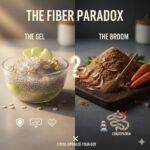Unlocking Muscle Health with Mitochondrial Calcium
Aging takes a toll on our muscles, sapping strength and endurance—a condition known as sarcopenia. A new study shines a spotlight on mitochondrial calcium (mtCa²⁺) uptake as a key soldier in fighting this decline and offers a surprising fix: oleuropein, a compound from olives. Here’s how it works and why it could be a game-changer for staying spry.
The Mitochondrial Muscle Connection
Mitochondria are the powerhouses of our cells, churning out ATP—the energy currency that fuels muscle contractions. Calcium inside mitochondria (mtCa²⁺) is the spark, linking muscle activity to energy production by revving up the TCA cycle’s enzymes, like pyruvate dehydrogenase. This process hinges on the mitochondrial calcium uniporter (MCU), a gatekeeper that ushers calcium in. When it works well, muscles hum; when it falters, they fade.
The study, profiling human muscle biopsies, patient-derived cells, and mouse models, found that mtCa²⁺ uptake weakens with age. A protein called MCUR1 (mitochondrial calcium uniporter regulator 1) takes a hit, dropping in levels and dragging down mitochondrial respiration. In aged human muscle cells, mtCa²⁺ uptake fell by 45%, mirroring sarcopenia’s hallmarks: low mass, weak strength, and sluggish movement. Knock out MCU in mice, and endurance tanks—proof that mtCa²⁺ is rate-limiting for muscle power.
Oleuropein: Nature’s Turbo Charger
Enter oleuropein, a polyphenol from olive oil. After screening 5,000 bioactive food compounds, researchers pegged it as a standout MCU activator. How? Its metabolite binds to MICU1 (another MCU subunit), turbocharging mtCa²⁺ uptake. In young and old mice, oleuropein juiced up mitochondrial energy output, slashing fatigue and boosting endurance. Aged mice with fading MCUR1 saw a comeback—mitochondrial activity and performance rebounded. But in MCU-knockout mice? No dice—oleuropein’s magic needs that calcium gateway intact.
Why It Matters
Sarcopenia’s current fixes—exercise and protein boosts—help, but they don’t directly target mitochondrial decline. Polyphenol-rich diets (think Mediterranean) hint at broader benefits, yet specific players like oleuropein were mysteries until now. This study ties mtCa²⁺ faltering to aging muscle woes and crowns oleuropein as a first-of-its-kind natural molecule to ignite mitochondrial bioenergetics. It’s not just a quick lift—chronic use sparks lasting muscle adaptations.
Aging doesn’t have to mean weaker muscles. By tackling a drop in mtCa²⁺ uptake—driven by lower MCUR1—this research flips the script on sarcopenia. Oleuropein, straight from olives, steps up as a targeted, food-derived fix, pumping up energy and stamina. Next time you drizzle olive oil, think of it as a sip of mitochondrial fuel—your muscles might just thank you.
How Much Olive Oil Do You Need Daily for Maximum Benefits?
Olive oil’s reputation as a health superstar is well-earned, thanks to its heart-friendly fats and antioxidants like oleuropein, a polyphenol recently spotlighted for boosting mitochondrial function in muscles (see the study on mtCa²⁺ uptake). But how much should you drizzle daily to reap the max rewards—without overdoing it? Let’s break it down.
The Science Sweet Spot
Research doesn’t pin an exact “oleuropein dose” for humans yet, but studies on olive oil’s broader benefits offer clues. The Mediterranean diet, a gold standard for longevity, typically includes 1.5–4 tablespoons (20–50 mL) of extra virgin olive oil (EVOO) daily. Here’s why that range shines:
-
Heart Health: A landmark PREDIMED trial found 4 tablespoons (50 mL) daily slashed cardiovascular risk by 30% in high-risk adults. Less (1–2 tbsp) still helped, but more amplified the effect.
-
Anti-Inflammation: Studies show 1.5–2 tablespoons (20–25 mL) deliver enough polyphenols to tame inflammation markers like CRP—key for chronic disease prevention.
-
Muscle Boost: The mitochondrial study used oleuropein doses in mice equivalent to human intakes of 2–3 tablespoons of EVOO, assuming typical polyphenol content (around 200–500 mg/kg). This aligns with enhanced endurance and energy metabolism.
Oleuropein in the Spotlight
Oleuropein is the star of that muscle-aging research, but its concentration varies. High-quality EVOO has 50–500 mg of polyphenols per kg, with oleuropein making up a chunk. To mimic the study’s benefits (improved mtCa²⁺ uptake), you’d need roughly 200–300 mg of polyphenols daily. That’s about 2–3 tablespoons (30–45 mL) of a robust EVOO—less if it’s polyphenol-packed (check labels for “high phenolic” or “robust” varieties).
Practical Daily Dose
For maximum benefits—heart, brain, muscles, and beyond—aim for:
-
2–4 tablespoons (30–50 mL) of extra virgin olive oil daily. 2 daily tablespoons of this brand ought to do the trick.
-
Why EVOO? It’s unrefined, retaining the most polyphenols and monounsaturated fats. Refined or “light” oils lose these perks.
-
How to Use It: Drizzle on salads and other foods or sip a spoonful raw (a Mediterranean trick). Just don’t use it as a cooking oil. Stick with more table oils like organic coconut oil, grass-fed butter, grass-fed tallow, or grass-fed ghee for cooking.
The Basics of EVOO Shelf Life
Unopened, EVOO typically lasts 18–24 months from bottling if kept cool and dark. Once opened, it’s best within 6–12 months, though polyphenols start fading after 3–6 months. Heat, light, and air are the enemies—think rancidity and muted taste. Harvest date (not “best by”) is your true freshness clue.
Don’t Overdo It
Olive oil is calorie-dense (120 kcal per tablespoon), so more isn’t always better. Beyond 4 tablespoons, you’re piling on calories without much extra polyphenol gain—most benefits plateau there. Balance it with your other macros (especially carbs) to avoid weight creep.
The Takeaway
Shoot for 2–3 tablespoons (30–45 mL) of high-quality EVOO daily to hit the sweet spot for oleuropein and overall health perks. It’s enough to fuel your mitochondria, protect your heart, and keep inflammation in check—without tipping the calorie scale. No measuring spoon handy? A rough guide: one tablespoon’s about the size of your thumb. Pour, enjoy, and let those olive-powered benefits roll in!









